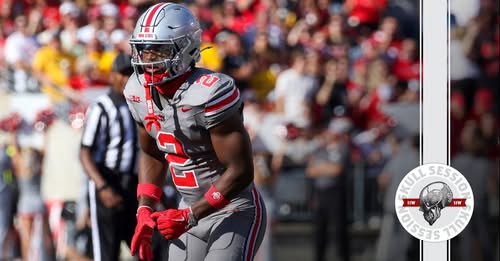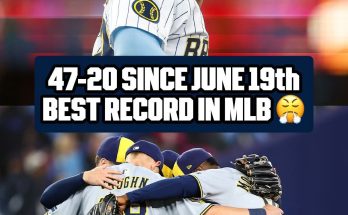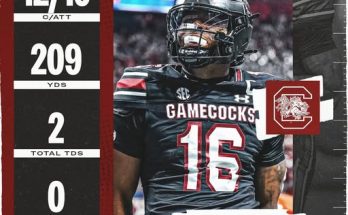“In 15 or 20 years, I’ll be able to look at my son or daughter and say, ‘That’s your dad on the cover of a video game,’” Caleb Downs told cleveland.com. “That’s a moment not many people get to experience, and it means the world to me.”
“In 15 or 20 years, I’ll be able to look at my son or daughter and say, ‘That’s your dad on the cover of a video game,’” Caleb Downs told cleveland.com. Those words carried weight. They weren’t spoken with arrogance or for attention. They were filled with gratitude, pride, and a sense of accomplishment that only someone who has been through the grind could truly understand. For Downs, being featured on the cover of a college football video game wasn’t just about publicity—it was a culmination of years of hard work, sacrifice, and the unwavering belief that greatness was possible if he stayed the course.
Long before he was a nationally recognized athlete or a name trending on social media platforms, Caleb Downs was a young kid with a dream. Born into a football family, the sport was always around him. It wasn’t forced on him, but it came naturally. He grew up watching games, absorbing the small nuances of defense, and imagining himself under the lights on Saturdays. His older brother, Josh Downs, paved part of that path with his own football journey, and Caleb followed, not as a shadow, but as a star of his own making. Every workout, every practice rep, every early morning and late night—it was all part of a larger vision. Not just to make it to college football, but to make an impact once he got there.
Downs came to Alabama with massive expectations. He was a top-rated recruit, considered by many to be one of the best defensive backs in the nation. The hype around him wasn’t just media-driven—it was echoed by coaches, analysts, and former players who saw his film and realized that he possessed instincts and technique far beyond his years. But hype means nothing without results, and Downs didn’t disappoint. From the moment he stepped onto the field in Tuscaloosa, he looked like he belonged. His poise, his football IQ, his ability to diagnose plays and react with surgical precision—it was all there. Week after week, he earned more playing time, and by the time his freshman season was over, he had already established himself as one of the premier safeties in college football.
The NFL was a clear future goal, but Downs wasn’t in a rush. He wanted to be great in college first. He wanted to win championships, earn All-American honors, and yes, make it onto the cover of a video game. For athletes of this generation, that cover represents something different than it did decades ago. It’s not just a marketing gimmick or a fun accolade—it’s a legacy marker. Being on the cover of a video game, particularly one as iconic as EA Sports’ college football franchise, means you’ve captured the imagination of fans across the country. It means you’ve earned national recognition. It means kids from all walks of life are going to play the game, choose your team, and use your character because they admire what you’ve done on the field.
And for Downs, it means something deeply personal. One day, he’ll sit down with his children and show them that image. He’ll point to it and say, “I was there. I worked for that. I earned that.” It will be a testament not just to his skill, but to his discipline, his choices, and his consistency. It’s a moment frozen in time that immortalizes his college career. And for a player who has spent years perfecting his craft, it’s a reward that no stat sheet can replicate.
But getting to that point wasn’t easy. Downs had to navigate the pressures of being a highly touted recruit. He had to block out the noise, the social media chatter, the constant comparisons. Every opponent wanted to test him. Every offensive coordinator schemed against him. Every mistake was magnified. But he remained steady. His preparation never faltered. His focus was unshakable. While many players would crumble under the weight of expectations, Downs seemed to thrive. He didn’t just want to play football—he wanted to be elite. He studied film religiously. He sought feedback from coaches. He refined his technique day by day.
And then came the honor of being selected for the video game cover. It wasn’t something he lobbied for. He didn’t campaign on Twitter or flash highlight reels begging for attention. It was simply the result of everything he had done on the field. It was recognition that couldn’t be bought—it had to be earned. The EA Sports team had their pick of dozens of talented players across the country, but Downs stood out. Not just for his stats, but for his consistency, his leadership, and the way he carried himself. He represented the best of college football—athletic excellence, mental toughness, and humility.
For fans of the game, his appearance on the cover means access to one of the most exciting and intelligent defensive players in the sport. For his teammates, it’s a proud moment to see one of their own honored. For Alabama football, it’s yet another sign of their ability to develop elite-level talent. And for Downs, it’s a personal milestone that validates years of effort.
But what comes next for Caleb Downs is even more exciting. He’s not the type to rest on achievements. Being on the cover is great, but it’s not the finish line. It’s a motivator, a symbol of where he’s been—but not where he’s going. Downs has his eyes on championships. He wants to be a part of a defense that dominates every game. He wants to lead by example, both vocally and through action. And he wants to continue refining his game so that when the time comes, he’s ready to make that leap to the professional level.
He’s also aware of the impact he can have off the field. Representation matters. When young athletes see a player like Caleb Downs on the cover, it sends a message. It tells them that greatness is achievable, that hard work pays off, and that integrity still matters in a world full of flash. Downs is the kind of role model that programs dream of. He’s not perfect—no one is—but he consistently strives to be the best version of himself. That commitment, both to football and to personal growth, is what sets him apart.
It also speaks to the evolution of college football. With the return of the EA Sports college football game after years of dormancy, the landscape has shifted. NIL deals, branding opportunities, and national exposure are now part of the conversation. For players like Downs, it’s a new world—one filled with opportunity but also responsibility. Being on the cover means more than it used to. It’s not just about who’s the best player—it’s about who represents the game the right way.
And Downs does exactly that. He carries himself with class, he leads with humility, and he competes with unmatched drive. His coaches speak highly of him. His teammates respect him. And fans across the nation are beginning to realize just how special he is. Years from now, when the video game cover is a framed photo on a mantle or a digital relic on an old console, the story behind it will remain powerful. It will be a story of a young man who had a dream, who worked tirelessly to chase it, and who reached a milestone that very few ever will.
In the world of college athletics, where moments come and go and headlines shift by the hour, legacies are hard to build. But Caleb Downs is building one. Brick by brick, game by game, moment by moment. The video game cover is just one chapter in that story. A beautiful, unforgettable chapter—but still just the beginning. Because Downs isn’t done yet. He’s still grinding. Still improving. Still chasing greatness.
And one day, when he does sit down with his children and show them the cover, he won’t just be telling them that he was in a video game. He’ll be showing them what’s possible when you believe in yourself, work harder than everyone else, and never lose sight of who you are. That’s the real legacy. That’s the story behind the cover. And that’s the Caleb Downs difference.



